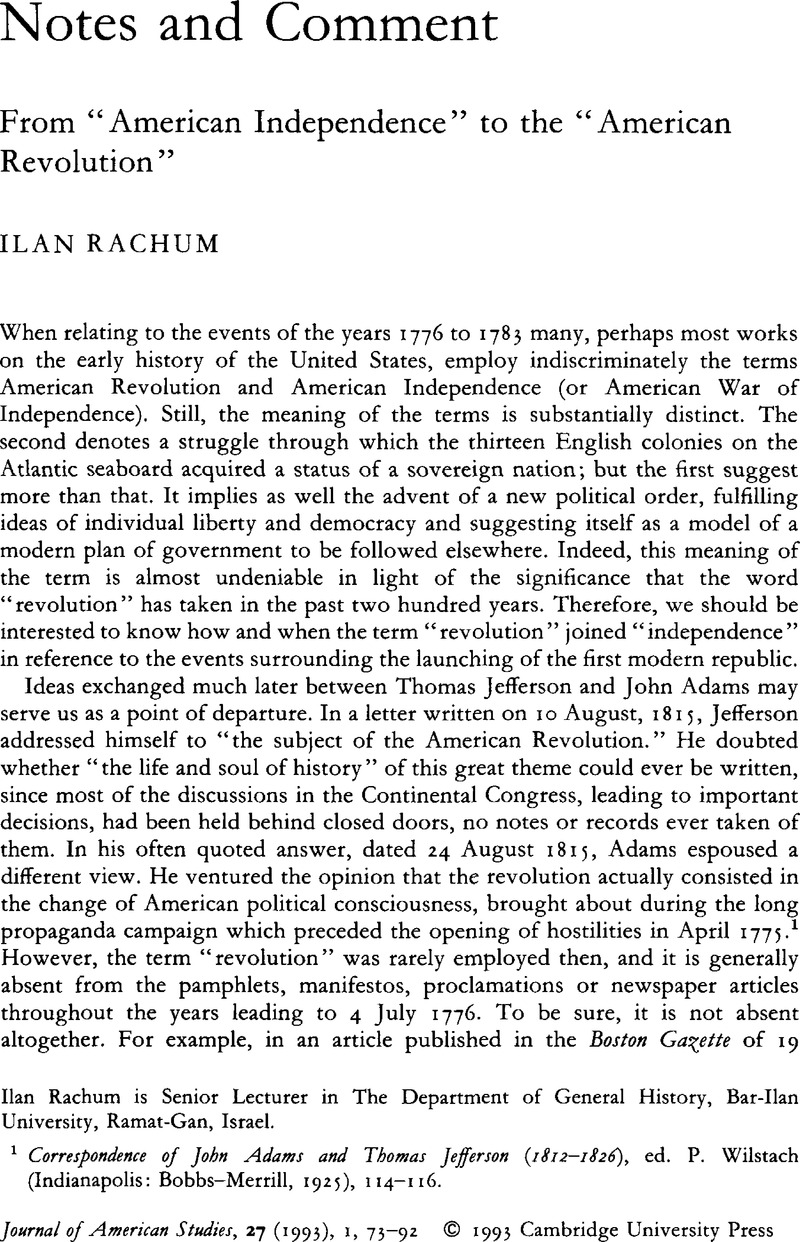Published online by Cambridge University Press: 16 January 2009

1 Correspondence of John Adams and Thomas Jefferson (1812–1826), ed. Wilstach, P. (Indianapolis: Bobbs–Merrill, 1925), 114–116.Google Scholar
2 The Writings of Samuel Adams, ed. Cushing, H. A. (New York; Putnam's Sons, 1904), I, 269Google Scholar. Also Jefferson in his “Summary View of the Rights of British America” of August 1774 employed “revolution” only in this context: “Since the establishment, however, of the British constitution at the glorious Revolution, on its free and ancient principles…”
3 Jefferson's remarks to this effect are in his Notes on Virginia, written in 1781–1782 and first printed in Paris in 1784. The term “revolution” is absent from Jefferson's vocabulary even at this comparatively late date. See The Writings of Thomas Jefferson, ed. Lipscomb, A. A. (Washington D.C., 1903), II, 165–166.Google Scholar
4 The Political Works of Thomas Paine (London, 1844), 33–34.Google Scholar
5 Ibid., 12.
6 Bailey, Nathan, Dictionarium Britannicum or a more Complete Universal Etymological English Dictionary than any Extant (London, 1730)Google Scholar; Johnson, Samuel, A Dictionary of the English Language (London, 1755).Google Scholar
7 Letters of Members of the Continental Congress, ed. Burnett, E. C., 7 Vols. (Washington D.C.: Carnegie Institution, 1921–1934), I, 526Google Scholar. Of the twelve letters mentioned three are by John Adams, but only in that of 3 July 1776 does he call independence a “mighty revolution.” The term is similarly absent from letters written in the two weeks following the Declaration and from the announcements of the president of the Congress, John Hancock, to the New Jersey Convention and to General Washington. Cf. Ibid., II, 1–23.
8 The Writings of Samuel Adams, III, 304.Google Scholar
9 On 23 June 1779 he referred thus to Benjamin Franklin: “It is universally believed in France, England and all Europe that his Electric Wand has accomplished all this Revolution but nothing is more groundless.” Diary and Autobiography of John Adams, ed. Butterfield, L. H., 4 Vols. (Cambridge, Mass.: Harvard University Press, 1961), II, 391, 408Google Scholar; III, 138.
10 The Oration is in “David Ramsay, 1749–1815; Selections from his Writings, ed. Brunhouse, R. L., Transactions of the American Philosophical Society, New Series, Vol. 55, Part 4 (1965), 183–190.Google Scholar
11 Letters of Benjamin Rush, ed. Butterfield, L. H. (Princeton: Princeton University Press, 1952), 221–222.Google Scholar
12 The American Crisis” No. 2, 13 01 1777Google Scholar, The Political Works of Thomas Paine, 55.Google Scholar
13 Journals of the Continental Congress, 1774–1789 ed. Ford, W. C., 34 Vols. (Washington D.C., 1904–1937), XII, 1013, 1063Google Scholar; XIII, 421, 1452Google Scholar. See also Letters of Members of the Continental Congress, IV, 59, 83.Google Scholar
14 Cited by Mintz, Max M., Gouverneur Morris and the American Revolution (Norman: University of Oklahoma Press, 1970), VII, 121.Google Scholar
15 For example, the periodical Affaires de l'Angleterre et de l' Amérique, actually sponsored by the French foreign ministry from 1776 to 1779, mistakenly reported in its first issue “M. Adams” as the author of the pamphlet Common Sense and “un des premiers pivots de la révolution.” See the quotation in a note in Diary and Autobiography of John Adams, II, 352.Google Scholar
16 Raynal, Guillaume Thomas François, Révolution de l' Amérique, (London, 1781), 183 ppGoogle Scholar. This and the English translation in just two pages less, were both printed by Lockyer Davis, Holburn. Raynal was perhaps not entirely pleased with the London publication because two years later he published an enlarged version in French, Tableau et révolutions des colonies angloises dans l'amérique septentrionale, 2 vols. (Paris, 1783).Google Scholar
17 Raynal, , 40, 59, 193, 126–127.Google Scholar
18 The Political Works of Thomas Paine, 186, 188.Google Scholar
19 Ibid, 151, 218.
20 Observations on the Nature of Civil Liberty, the Principles of Government, and the Justice of the Policy of the War with America (London, 1776)Google Scholar. See Cone, Carl B., Torchbearer of Freedom; The Influence of Richard Price on Eighteenth Century Thought (Lexington: University of Kentucky Press, 1952), 76–82Google Scholar. Also Thomas, D. O., The Honest Mind; the Thought and Work of Richard Price (Oxford: Oxford University Press, 1977), 148–151.Google Scholar
21 Cited by Cone, , 107.Google Scholar
22 Thomas, , 263–268Google Scholar; Laboucheix, Henri, Richard Price, théoricien de la révolution américaine (Paris: Didier, 1970), 41–42, 162.Google Scholar
23 “Most of the distresses of our country and of the mistakes which Europeans have formed of us, have arisen from the belief that the American Revolution is over. This is so far from being the case that we have only finished the first act of the great drama. We have changed our forms of government but it remains yet to effect a revolution in our principles, opinions and manners so as to accommodate them to the forms of government we have adopted”: Letters of Benjamin Rush, 388.Google Scholar
24 “David Ramsay, 1749–1815; Selections from his writings,” 92Google Scholar. Ramsay, and Jefferson, kept on corresponding until 1813.Google Scholar